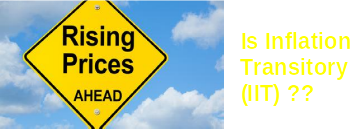Why inflation is likely not transitory.
There is a simple reason as to why US inflation is likely NOT transitory: The American public's demand for ever greater amounts of money-printing to offset the recent price increases. This demand manifested itself in late October, 2022, just before the mid-term Congressional elections.
Newsweek claims that a majority of the American people now want the Federal government to issue more stimulus checks in order to offset inflation. Newsweek surveyed more than a thousand "likely voters" and claims that its survey
found [that] 63 percent of respondents said they agree—with 42 percent saying they "strongly agree"—when asked if the federal government should issue new stimulus checks to tackle inflation.
Eighteen percent of respondents disagreed, while 15 percent said they neither agree nor disagree. Three percent said they do not know in response to the question.
On Twitter, participants roundly scorned or mocked the results of Newsweek's survey, and participants who took issue with this scorn were "Twitter ratioed."
That the American people would support continued money-printing under current economic circumstances should not surprise anyone who has followed recent political and economic news from Great Britain, where the government is likely to print billions of more pounds in order to subsidize consumers' energy bills this winter. In other words, the British government has already adopted the policy that American voters are now demanding from American politicians and for the same reasons. The British voters demanded that their government print more money in order to disburse that money as an energy subsidy to straitened British consumers, who face sharply higher energy bills this winter due to energy inflation. Does that not seem a bit circular?
Trenchant observer Ryan McMacken recently expressed an opinion that concurs with IIT's prediction. McMacken opined that the recent Congressional mid-term election is unlikely to produce any significant changes in federal fiscal policy (a policy of enormous deficits due to unrestricted spending) because Republicans are just as eager to spend as Democrats are. McMacken writes:
The only disagreements we'll see in Washington in the next two years will be over how exactly to run up the next massive annual deficit.
Indeed, if the economy continues to slide as we're now seeing it do — with thousands of new layoffs coming from the tech sector just this week, and with real estate falling — we can expect a new bipartisan consensus in Washington calling for a wide variety of new "stimulus" programs. Neither party will want to be seen as the party of austerity.
When you subscribe to the blog, we will send you an e-mail when there are new updates on the site so you wouldn't miss them.

Comments